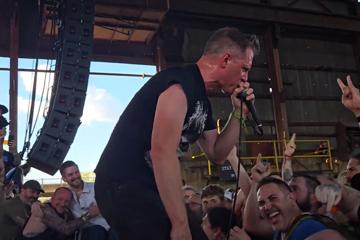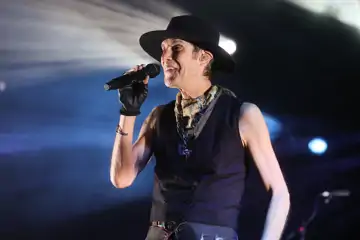When telling the story of a seemingly mismatched couple faced with an unexpected pregnancy in his movie Knocked Up, writer-director Judd Apatow wanted to present the characters played by Seth Rogen and Katherine Heigl with what he calls “The Ghosts Of Christmas Future”, an illustration of what adult relationships can be like. That's where Debbie – the older sister of Heigl's character, played by Leslie Mann – and her husband Pete, played by Paul Rudd, came in.
The parents of two young girls, Debbie and Pete were clearly committed to one another but also frequently combative, and their life together seemed to be no bed of roses. “I wanted to scare Seth and Katherine's characters a little bit, and so I tried to show how it can be really hard,” says Apatow. “It seemed appropriate for a young couple to witness the difficulties of long-term commitment. And a lot of that cut really close to the bone for some people!”
If one were to play armchair psychologist, it could be determined that Apatow drew fairly heavily from his own life in depicting Debbie and Pete – after all, Mann is Apatow's wife in real life, and he did cast his actual daughters, Maude and Iris, to play the screen couple's kids. And with Knocked Up, he admits he felt he'd only “scratched the surface” of the family dynamic.
“I wanted to show all of it,” he says. “I wanted to really humanise them so you can see what's great about them, what their wounds are, what they're projecting onto each other. And with my kids, Maude and Iris, now being five years older it seemed that there was a lot more to talk about when it came to raising girls in this day and age. There were so many things happening in my house, so many things they were fighting with me about.”
All of which has resulted in Apatow's new film This Is 40, which places the focus well and truly on Debbie and Pete as they reach the titular age (well, Debbie claims to be 38) and confront the choices they've made and the challenges of modern life.
For Apatow, who's now 45, turning 40 provides something of a lightbulb moment when people tend to realise they've well and truly become the person they turned out to be. “I think it's a moment when people take stock of how they're doing,” he says. “You know, 'This is my job, this is my wife, this is my family... how do I feel about all that? How can I make it work better?' A lot of the movie is about people trying really hard to fix everything and how that often leads to everything going terribly awry. That's what makes the movie interesting and dramatic as well as funny.”
Apatow didn't necessarily think all audiences would relate to what Debbie and Pete go through in This Is 40 – and their crises range from economic to emotional – but he was pleased to find that when he started showing the finished product to people he got feedback like “I felt like you had a camera in my house” and “In one week, I've had seven moments exactly like moments from your movie”.
“That was really gratifying because I think we're all dealing with the same things, trying to be good parents or a good husband or make our jobs work or keep our health,” he says. “And there really aren't enough hours in the day to do them all correctly.”
But he was keen to ensure that This Is 40 was an even-handed look at family life, one in which every member was presented as fully-rounded and three-dimensional. “I wanted people to leave the theatre feeling that both Debbie and Pete were equally likeable and equally flawed,” he says. “That's the goal. And I think we accomplished that. If anyone came out going 'Leslie was right, Paul was wrong', I'd feel like I failed.”
This Is Forty is in cinemas Thursday 17 January















